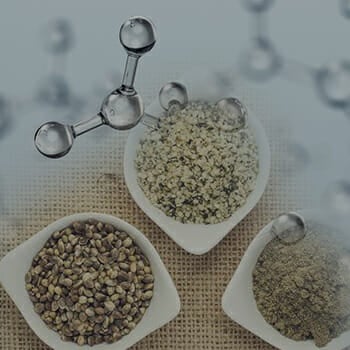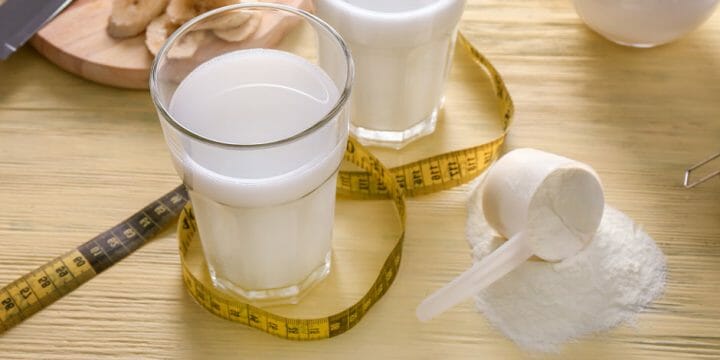Hemp protein powder is fast becoming one of the most popular products for many athletes.
I wouldn't say that it has overtaken whey just yet, but there are a lot of health advantages that are gradually coming to light.
Before you start blindly switching to different protein products, take the time to make sure you don't end up with supplements that don't help your goals.
And to help you with that, I sat down with my dietitian to try and figure out the hemp protein vs. whey debate.
Quick Summary
- Hemp protein is plant-based and suitable for lactose intolerance, while whey protein aids in quick muscle recovery; both have unique side effects.
- Hemp protein offers all essential amino acids and is more digestible for some, whereas whey protein is a complete source with rapid absorption.
- Hemp protein is an anomaly among plant proteins, containing all 20 amino acids, including the 9 essential ones.
- Personally, I find hemp protein to be a more sustainable and gut-friendly option, especially for those with dairy sensitivities.
What's the Difference Between Hemp and Whey Protein?
The main difference between hemp and whey protein is that whey is a dairy product in the form of a milk isolate, while hemp protein is extracted from hemp seeds.
That's the obvious difference. When you look at the nutritional values, it gets interesting. That does make hemp stand out a bit like a healthy option.
It should be noted that whey contains some saturated fats and cholesterol, while hemp only contains unsaturated fats [1].
Both whey protein and hemp protein are excellent sources of essential amino acids, but hemp protein also offers additional benefits due to its plant-based nature.
You might also have heard that hemp is rich in fiber, according to the LiveStrong [2]; however, you should consider that many supplements don't process the hemp seed shells where most of the fiber is found. Incorporating both whey protein powder and hemp protein into your diet can provide a diverse array of nutrients and support your fitness and nutritional goals effectively.
Benefits of Hemp Protein Powder

There are a lot of benefits when it comes to hemp-based protein powders that go beyond it being a sustainable plant-based product.
Having tried hemp protein myself, I appreciate its benefits. For me, the most interesting fact is about the essential amino acids.
The reason I don't tend to recommend plant-derived protein powders is that pretty much all plants don't contain the complete range of amino acids. You can read more about this in our plant vs whey protein article.
That means you would need to stack them. However, hemp is kind of a nutritional anomaly. Not only does it contain all 20 amino acids, including the 9 essential ones [3], but your digestive system may be able to process it more easily than other plant supplements, according to the research published in PubMed [4].
Hemp protein offers an excellent alternative for those with lactose intolerance or milk allergies, as it is not only easily digestible but also free from the common allergens found in whey protein, ensuring a gut-friendly experience.
When considering the environmental footprint, hemp protein stands out for its sustainability, requiring significantly less water and land, and producing a lower carbon footprint compared to whey protein, making it a more eco-friendly choice for environmentally conscious consumers.
Benefits of Whey Protein Powder
The main reason why whey protein powder has become one of the most popular post-workout proteins comes down to the fact that especially whey isolate is known to be easy to digest. Some studies have reported measuring increases in protein levels after 20 minutes [5].
From my experience, whey protein's popularity post-workout is due to its quick absorption.
Add to that the fact that whey contains all 9 essential amino acids, you could be providing your body with the most important nutrients to help with muscle recovery and building.
"Seeing as the threshold for activating protein synthesis occurs right around 2.5 grams of leucine, whey is a no-brainer for athletes looking to boost growth, recovery, and performance."
- Krissy Kendal Ph.D., Lecturer in Health Science
Other whey protein powder articles:
Potential Side Effects of Hemp Protein

Although uncommon, be mindful of hemp seed allergy symptoms such as stomach cramps, nausea, hives, itching, and difficulty breathing.
I advise caution with hemp protein; I've seen rare cases of allergies causing symptoms like stomach cramps and nausea. Test your tolerance with a single serving post-exercise before regular use.
One of the more common issues that some athletes have reported is reactions to the relatively high content of minerals like iron and copper , according to the Nutrition & Metabolism[6].
Always read the label for recommended daily dose and avoid excessive amounts. For most people, this shouldn't be an issue, though.
Related articles:
Potential Side Effects of Whey Protein
In my coaching experience, dairy intolerance reactions like digestive issues are common with whey protein. While it's low in lactose [7], some people may still have significant digestive responses to anything that is sourced from milk, like whey or casein protein powder.
Adverse reactions to whey often result from excessive consumption, which can strain your digestive system, leading to nausea, stomach cramps, and diarrhea.
It's advisable to consult a dietician or nutritionist before incorporating whey protein powders into your diet to ensure it's suitable for you.
Protein Sources for Better Results

Through my testing, I've compared plant and animal proteins to find the most effective sources for different goals.
If you don't have lactose intolerance or follow a strict plant-based diet, we have some recommendations based on our findings.
Muscle Gain: If you're looking to bulk up or you're into bodybuilding, then I would still recommend sticking with whey.
It has all the essential amino acids, and you'll struggle to find anything that is as easily digestible.
Weight Loss: From every bit of research I've read, and extensive conversations with my dietitian, I have to say that hemp protein powder may be the better option for weight management.
The lower amount of saturated fats and calories are significant factors. But also consider that it may help fill you up thanks to some quality fiber.
See our other related protein powder guides:

FAQ

Can You Build Muscle With Hemp Protein?
Yes, you can build muscle with hemp protein as it contains the full range of amino acids. Hemp is the only plant-derived protein known to provide that, so you don't have to stack it with some other high-quality sources.
Does hemp protein contain BCAAs?
Yes, hemp protein contains BCAAs, which may have a significant benefit when it comes to training performance and recovery. Hemp is unique in this regard, as the majority of non-animal derived sources are generally low in BCAAs.
Can hemp protein help you gain weight?
Yes, hemp protein can help you gain weight for bodybuilding and bulking. Many vegan and vegetarian athletes have turned to this high-quality protein because it may provide the most important nutrients for bulking.
Can hemp seeds replace protein powder?
Yes, hemp seeds can replace protein powder, but you may want to rely on the extracted powder form. While it's easy to add the seeds to other foods, it's highly unlikely that you can eat enough of them for your athletic needs.
References:
- https://www.medicalnewstoday.com/articles/323037
- https://www.livestrong.com/article/221321-hemp-vs-whey-protein/
- https://www.ncbi.nlm.nih.gov/pmc/articles/PMC6245118/
- https://www.ncbi.nlm.nih.gov/pubmed/20977230
- https://www.precisionnutrition.com/whey-vs-casein
- https://www.ncbi.nlm.nih.gov/pmc/articles/PMC2868018/
- https://www.precisionnutrition.com/whey-protein-allergies-intolerances-bloating
About The Author
You May Also Like






